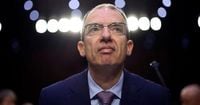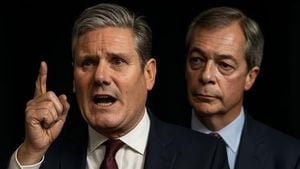In a move that’s sent shockwaves through the public health and pharmaceutical sectors, Health and Human Services Secretary Robert F. Kennedy Jr. has come under fire for a series of sweeping changes to U.S. vaccine policy, igniting fierce debate among medical professionals, industry leaders, and lawmakers. As these developments unfold, questions abound about the future of vaccine access, research innovation, and America’s preparedness for infectious disease threats.
On September 9, 2025, The Washington Post published a sharply worded opinion piece taking Kennedy to task for what it described as repeated betrayals of promises he made during his confirmation hearings. The article accused Kennedy of "implementing policies straight from the anti-vaccine playbook, directly contradicting promises he made during his confirmation hearings." The editorial went further, warning that "states may need to act to protect vaccine access and public health amid Kennedy's controversial leadership."
Just hours after the opinion piece hit the presses, the WIRED Health summit in San Francisco became the stage for another high-profile rebuke. Moderna CEO Stéphane Bancel, whose company is at the forefront of mRNA vaccine development, minced no words in responding to Kennedy’s recent policy shifts. "I think it complicates things for people," Bancel said, pointing out that the new restrictions on COVID-19 vaccine eligibility make it harder for families to protect vulnerable loved ones. "You might have somebody in your household—a parent, a spouse, a kid—who is at high risk that you want to protect."
The controversy centers on a cascade of policy decisions that have unfolded since Kennedy took office as HHS secretary in February. Most notably, the Food and Drug Administration (FDA) last month approved updated COVID-19 vaccines but, for the first time since the pandemic began, restricted their use to individuals aged 65 and older or those with underlying health conditions. The previous recommendation—endorsed by leading health agencies worldwide—had been to vaccinate everyone six months and older. Now, several states require a prescription to receive a COVID-19 shot, a hurdle that public health advocates say could deter millions from seeking protection.
It’s not just COVID-19 vaccines that have been affected. In May, Kennedy abruptly terminated a $590 million federal contract with Moderna for the development of an mRNA-based bird flu vaccine candidate. The contract, awarded during the final days of the Biden administration in January, was intended to bolster America’s defenses against a virus that has been causing outbreaks in poultry and U.S. dairy cows since March 2024. While human cases have so far been rare and limited to farm workers, scientists warn that the bird flu could spark a pandemic if it mutates to spread easily between people.
Kennedy’s rationale for the contract termination and subsequent policy changes has drawn intense scrutiny. In May, he announced that the Department of Health and Human Services would no longer recommend mRNA COVID-19 vaccines for healthy children and pregnant women—a move that many experts saw as a major departure from established medical guidance. Then, in June, the FDA ordered new safety labeling for mRNA COVID-19 vaccines, highlighting the rare but documented risks of myocarditis and pericarditis, particularly in young men. While transparency about side effects is important, some health leaders argue that the new warnings—and the overall shift in tone—risk fueling vaccine hesitancy at a critical time.
August brought yet another policy bombshell: as part of what HHS described as a “coordinated wind-down” of mRNA vaccine research, Kennedy’s department canceled 22 research contracts and investments totaling nearly $500 million. Instead, HHS signaled it would shift funding to an older vaccine platform known as "whole-virus" vaccines. Kennedy, in a statement, justified the move by claiming that mRNA vaccines “fail to protect effectively against upper respiratory infections like Covid and flu.” Public health advocates and vaccine researchers have pushed back hard against this assertion, citing robust evidence of mRNA vaccines’ effectiveness in preventing severe disease and death.
Bancel addressed these concerns head-on at the WIRED Health summit, defending the safety and efficacy of mRNA vaccines. "I don't think there's been a vaccine more studied for efficacy and safety in the history of vaccines," he said. "In terms of vaccine efficacy and safety, there's been studies done in literally millions of people in the real world." According to Bancel, the intense scrutiny and vast data collected since the rollout of COVID-19 vaccines should reassure the public, not sow further doubt.
Despite the setbacks, Moderna has not retreated from the vaccine space. In fact, the company recently received expanded FDA approval for its respiratory syncytial virus (RSV) vaccine, which now covers adults aged 18 to 59 who are at increased risk of disease. The vaccine had initially been greenlit in May 2024 for adults 60 and older. Bancel acknowledged that the regulatory environment has been challenging. "I think a lot of people back in January, including my own team, were quite worried that we might not get those approvals," he said. But he remains "encouraged by the dialog" with the FDA and optimistic about the future.
One area where mRNA research appears to have weathered the storm is cancer. Moderna currently has 45 cancer-related mRNA programs in its pipeline and expects to secure 10 FDA approvals within the next three years. "We are using exactly the same technology to go from infectious disease to cancer," Bancel explained, suggesting that the administration’s crackdown on mRNA research has not yet extended to this promising field.
The policy changes have left many Americans confused and concerned. Previously, any healthy individual could walk into a pharmacy and receive a COVID-19 vaccine. Now, with new age and health restrictions, and in some cases, the requirement for a doctor’s prescription, access has become more complicated—especially for those living in states that have adopted the stricter federal guidelines. Public health officials are warning that these barriers could undermine the country’s ability to respond quickly to future outbreaks, whether from COVID-19, bird flu, or other emerging threats.
Meanwhile, lawmakers on Capitol Hill are watching closely. Earlier this week, the Senate Finance Committee grilled Kennedy about his actions in office thus far, pressing him to explain the rationale behind the administration’s increasingly skeptical stance toward mRNA vaccines. With the stakes so high, the debate over vaccine policy in America is far from settled.
As the dust settles, the country faces a critical juncture—balancing the need for transparency and safety with the imperative to maintain public trust and access to lifesaving vaccines. The outcome of these policy battles will shape the nation’s health landscape for years to come.




